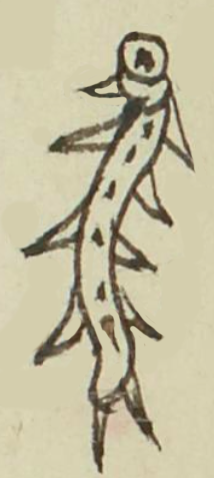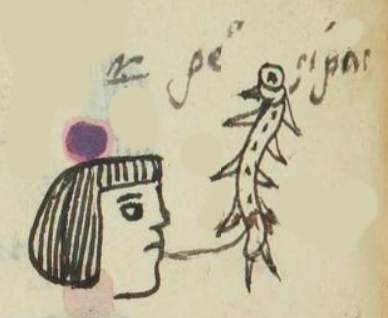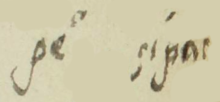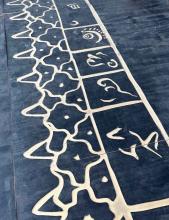Cipac (MH713v)
This black-line drawing of the simplex glyph for the personal name, Cipac ("Crocodile"), is attested here as a man's name. The glyph shows an undulating, near S-shape that is covered with what are ten, long, sharp thorns or flint knives. The body has dots down the center of the back, too. The head is round with a large dot in the center. Cipactli (apocapated in the gloss) is the name of a day sign in the 260-day divinatory calendar called the tonalpohualli. Typically, a personal name from this calendar would have also had a number from 1 to 13 associated with the day sign. Sometimes the number falls away.
Stephanie Wood
See the Borgia Codex, Plate 21, for a representation of the animal covered with the red and white knife called the tecpatl. Another Borgia image, Plate 27, of this animal also has flint knives on its body. Mexicolore publishes both of these images. Some Cipac glyphs are more crocodilian and some are more abstract or stylized. A few look like fish. See below for some examples.
Stephanie Wood
peo çipac
Pedro Cipac
Stephanie Wood & Jeff Haskett-Wood
1560
Jeff Haskett-Wood
cocodrilos, cocodrilo, caiman, caimanes, crocodiles, cipactli, nombres de días, fechas, calendarios, nombres de hombres, ondulante
This iconographic detail showing crocodile skin comes from a work of art by Mariana Castillo Deball, “Cocodrilo piel de los días” (2021), serving as yet another example of how interest in ancestral painting and writing lives on in modern times. Museo de Arte de Zapopan. Photo by S. Wood, 17 April 2025.

cipac(tli), crocodile, caiman, alligator, https://nahuatl.wired-humanities.org/content/cipactli
Cocodrilo o Caimán
Stephanie Wood
Matrícula de Huexotzinco, folio 713v, World Digital Library, https://www.loc.gov/resource/gdcwdl.wdl_15282/?sp=505&st=image
This manuscript is hosted by the Library of Congress and the World Digital Library; used here with the Creative Commons, “Attribution-NonCommercial-ShareAlike 3.0 License” (CC-BY-NC-SAq 3.0).







